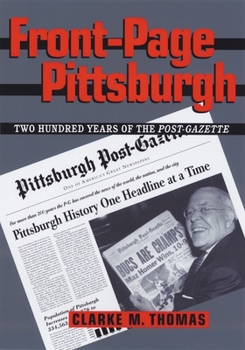Front-Page Pittsburgh: Two Hundred Years Of The Post-Gazette
The first issue of the Pittsburgh Gazette was published on Saturday, August 12, 1786. Nearly 220 years later, it lives on as the Pittsburgh Post-Gazette, the dominant paper in a major U.S. city: survivor of name changes, ownership sales, numerous mergers, and a competitive landscape once populated by more than fifty newspapers. Clarke Thomas's history of the paper stretches from the Whiskey Rebellion to the controversies surrounding the North Shore and downtown redevelopments of today. By focusing on what stories were reported-and how-he adds a fascinating dimension to the history of Pittsburgh and its people.The story of the Post-Gazette is inextricably entwined with that of its city. Thomas reveals how the paper and its predecessors have influenced local politics and business, through behind-the-scenes personal connections as well as the editorial positions advocated by the publishers. By looking closely at key business decisions, Thomas illustrates how the first newspaper published west of the Alleghenies emerged as the last one standing in Pittsburgh following the devastating labor strike of 1992.Over the years, almost every reader of the Post-Gazette has found something to complain about. To Republicans, the paper often seemed uncritically supportive of officials elected by an overwhelmingly Democratic electorate. To Democrats, the frequent revelations of misbehavior by various public officials amounted to party harassment. Neither group was happy with the Post-Gazette's reputation as a "switch-hitter" in endorsing candidates of both parties. The paper's editorial positions frequently have come under fire. Many readers did not agree with the newspaper's support of the civil rights movement and school desegregation in the 1960s. Roman Catholics have been troubled by the Post-Gazette's pro-choice stance on abortion. Jewish readers have been upset with the emphasis on the rights of Palestinians in the discussion of Arab-Israeli relations. Business leaders have decried the shift away from the stridently pro-business principles the Post-Gazette espoused in the mid-twentieth century. Progressive political groups complain that it hasn't shifted far enough to reflect the current needs of the city. In the end, however, many Pittsburghers have come to trust and respect the paper's fairness in dealing with various viewpoints. And, as Thomas argues, this explains why-from the Johnstown Flood to the crash of USAir flight 427-whenever Pittsburghers have needed or wanted the news, they have turned to the Post-Gazette.
Format:Hardcover
Language:English
ISBN:0822942488
ISBN13:9780822942481
Release Date:February 2005
Publisher:University of Pittsburgh Press
Length:332 Pages
Weight:0.70 lbs.
Dimensions:1.2" x 7.3" x 10.2"
Customer Reviews
1 rating
Add A Star If You're From Pittsburgh
Published by Thriftbooks.com User , 19 years ago
I'm not from Pittsburgh so some of this matter went over my head but I must say that Clarke Thomas is a smooth journalist of the old fashioned kind who believes that language's transparency can be used to convey information directly to the reader, without bias, without slanting. His history of The Pittsburgh Gazette is interesting because it parallels American history. Why, the Gazette was founded before the US Constitution was signed! It's hard to believe but people loved the news even back then, so much so that horses would deliver the paper on broadsides and it would be read on the village square and in pubs in the tiny hamlets of western Pennsylvania. Reading the progress of the paper over the years of the nineteenth century made me think of that movie THE VILLAGE, the recent film for which an old time village was fabricated in the woods outside Pittsburgh or wherever. The most intriguing characters were the Block family. For me, they were examples of courage because they dared press for integration, both subtly and openly, as the calendar moved from the 1930s through the 1940s and 1950s. Just as Branch Rickey and Jackie Robinson and other enlightened figures in baseball gave us a glimpse into an integrated USA, Pittsburgh had its own quiet heroes. Paul Block, the one who engineered the merger of the POST and the GAZETTE, had an intriguing career too! I have read many books on Hearst and Marion Davies, and never ran into the story which Mr. Thomas reports in this book--that Block and Davies were an item before she met Hearst, and that the three of them palled around together even after she took up with Hearst (one newsman after another for our favorite comedienne, Marion Davies)! It is an eye-opener for sure and presents an interesting sidelight on a much-discussed liaison. I hope that this book will soon produce a related sequel, perhaps one that will reprint the texts of the articles Thomas discusses. It would be great if we had the entire run of the Post-Gazette's coverage on, say, for example, favorite son Andy Warhol, and watch the paper deal with social and artistic changes over the decades.






